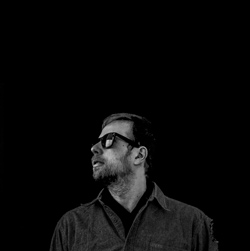
The Cy Dune story starts with a songbook. This particular book had 100 songs written in 20th century American visionary longhand during a five-year period when Seth Olinsky left home and traveled the world in what some might call the contemporary music scene of the early 21st century, recording and performing with his band Akron/Family and collaborating with Rhys Chatham, Michael Gira, William Parker, Hamid Drake, Keiji Haino and Tatsuya Nakatani—new and old friends in big city and small town apartments, parent’s garages, horse barns, Maine basements, New Jersey Synagogues, old Pennsylvania factories, molding midcentury moderns, Brooklyn basement studios and across the bridge at the Midtown Manhattan Sear Sound studio with the old Abbey Road tape machine and the bass player from the Henry Rollins band. In 2010, the 100 songs were written, finished and demoed. In 2011, Olinsky moved to the Sonoran desert to record a primitivist-blues-old-New-Weird-America anthology of these songs with only an old acoustic guitar and the very same rebuilt 1/4-inch tube Ampex reel-to-reel that Alan Lomax used to record field hollers out of his trunk. Months were spent fine-tuning the 100 songs; researching tube and tape saturation, Fahey’s discovery of Skip James and his mystical open-D tuning, early Dylan cryptology, the notes between the notes on Leadbelly recordings, and Michael Hurley’s First Songs; and re-tuning all guitars to that self-same slightly flat key. But the 100 songs wouldn’t record. 2011 ended and the spark of change finally came as a Christmas gift given by his mother: Patti Smith’s Just Kids. Re-awed by the transformative powers of rock ’n’ roll, frustrated, fed up, Olinsky plugged in his guitar and the songs ripped themselves into being, bursting out as sheets of guitar-shredding sound like explosions written on the wall. Smith’s book begins the year Coltrane died. Cy Dune’s story begins again with the simple act of plugging in his guitar, mimicking the thrust of the 20th century.